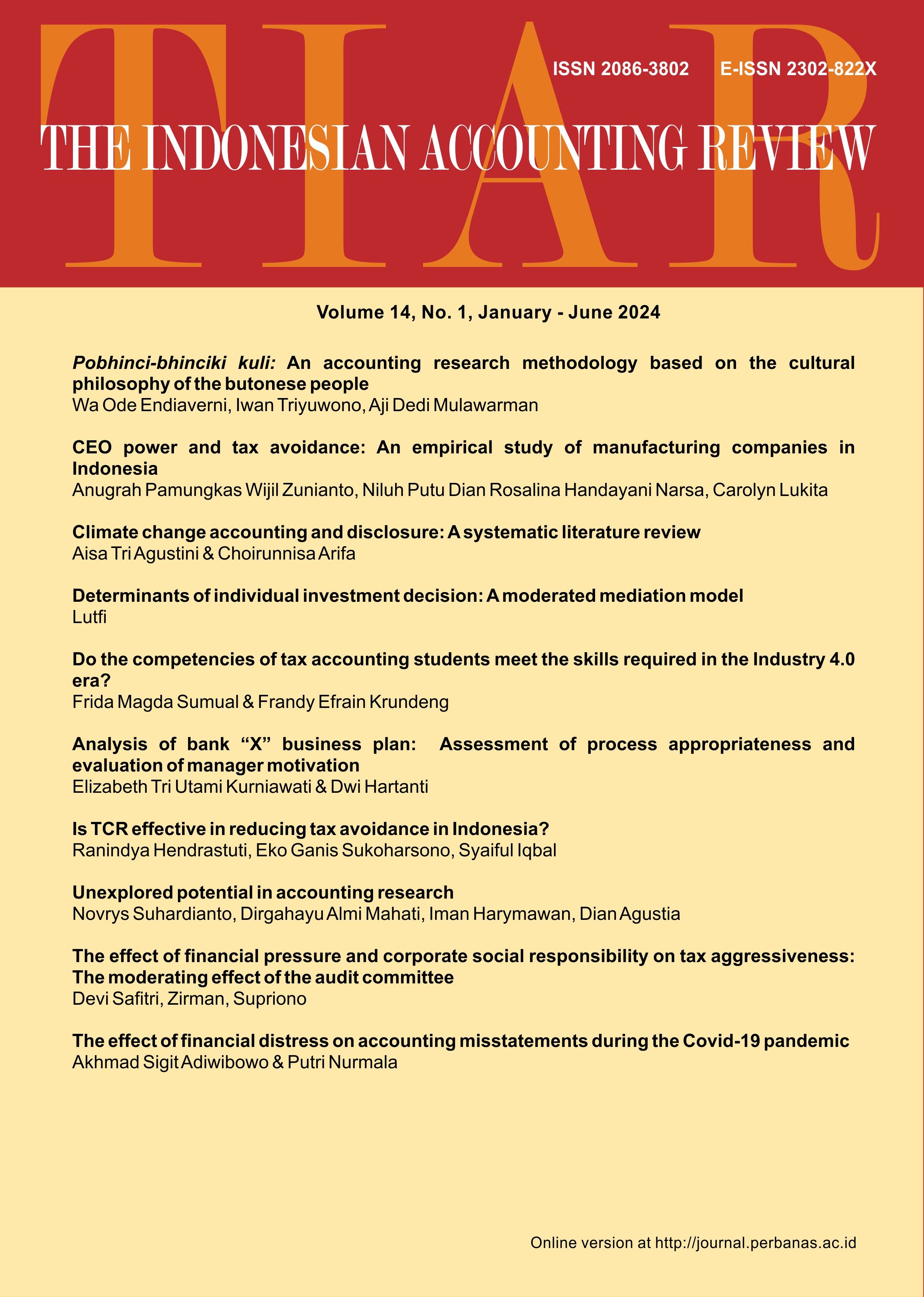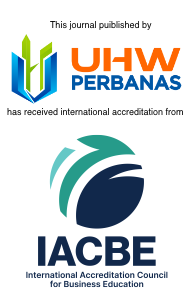Pobhinci-bhinciki kuli: An accounting research methodology based on the cultural philosophy of the butonese people
DOI:
https://doi.org/10.14414/tiar.v14i1.3747Keywords:
Cultural philosophy, Pobhinci-bhinciki kuli, Accounting researchAbstract
This research aims to develop an accounting research methodology based on the cultural philosophy of the Butonese people, “pobhinci-bhinciki kuli”. In the Wolio language (Buton Sultanate), pobhinci-bhinciki kuli means pinching each other’s skin or feeling like they are in the same boat. This research uses a literature review method. Validity is confirmed through interviews with Butonese cultural figures, sociologists, anthropologists and writers. The findings indicate that research methodology developed from local wisdom can be used to produce research that is more holistic in describing the reality of Indonesian society. The Butonese people’s philosophy of life “pobhinci-bhinciki kuli” upholds purity of feeling, as an indicator. The feeling in question is a divine feeling that is continuously felt and pursued through kangkilo (purity). Therefore, the scientific implications of using pobhinci-bhinciki kuli will return to the authenticity of the local wisdom of Indonesian society which is always oriented towards the main value of purity in moving towards true divinity by prioritizing the integrity of reality. The achievements of science are not only rational but united and moving in the purity of awareness of holiness in its theoretical, research and empirical forms in accounting research methodology.
References
Addin, A. (2011). Undang-Undang Murtabat Tujuah Kesultanan Buton (Seri Buku). Yayasan Fajar Al Bhutuni.
Braginsky. (1993). Tasawuf dan Sastra Melayu: Kajian dan Teks-Teks. RUL.
Burrell, G., & Morgan, G. (1979). Sociological paradigms and Organisational Analysis: Elements of The Sociology of Corporate Life. Heinemann Educational Books.
Chua, W. F. (1986). Radical Developments in Accounting Thought. The Accounting Review, 61(4), 601–632.
Kamayanti, A. (2021a). Metodologi Penelitian Kualitatif Akuntansi: Pengantar Religiositas Keilmuan. Yayasan Rumah Peneleh.
Kamayanti, A. (2021b). Paradigma Nusantara Methodology Variety: Re-embedding Nusantara Values into Research Tools. International Journal of Religious and Cultural Studies, 3(2), 123–132. https://doi.org/10.34199/ijracs.2021.09.02
Kamayanti, A. (2022). Metodologi Paradigma Nusantara. Penerbit Peneleh.
Lutfillah, N. Q. (2016). Akuntansi Gayatri dalam Perluasan Wilayah Kekuasaan Kerajaan Majapahit. Disertasi. Universitas Brawijaya.
Mahrudin. (2015). Nilai-Nilai Hukum dalam Undang-Undang Martabat Tujuh Buton. Jurnal Al-’Adl, 8(2), 123–139.
Mulawarman, A. D. (2010). Integrasi Paradigma Akuntansi: Refleksi Atas Pendekatan Sosiologi dalam Ilmu Akuntansi. Jamal, 1(1), 155–171.
Mulawarman, A. D. (2021). Paradigma Nusantara: Decolonizing Science Agenda. International Journal of Religious and Cultural Studies, 3(2), 99–122. https://doi.org/10.34199/ijracs.2021.09.01
Mulawarman, A. D. (2022). Paradigma Nusantara (A. Kamayanti, Ed.). Penerbit Peneleh.
Niampe, L. (2007). Undang-Undang Sarana Wolio: Sutingan Teks disertai dengan Telaah Filosofis Aspek Mistiknya. Universitas Padjadjaran.
Rachman, T. (2018). Tradisi Kangkilo: Refleksi Paham Taswuf dan Politik Kekuasaan dalam Masyarakat Buton. Angewandte Chemie International Edition, 6(11), 951–952., 10–27.
Rosidin, A. (2015). Nilai-Nilai Kehidupan Masyarakat Buton (S. Udu, Ed.). Oceania Press.
Triyuwono, I. (2003). Sinergi Oposisi Biner: Formulasi Tujuan Dasar Laporan Keuangan Akuntansi Syari’Ah. Parameter, 3(1), 79–90. https://doi.org/10.37751/parameter.v3i1.57
Triyuwono, I. (2015). Akuntansi Syariah: Perspektif, Metodologi, dan Teori. PT Rajagrafindo Persada.
Udu, S. (2020). Inovasi Desa Wisata: Menuju Power Society. OceaniaPress.
Downloads
Submitted
Published
How to Cite
Issue
Section
License
Copyright (c) 2024 The Indonesian Accounting Review

This work is licensed under a Creative Commons Attribution-NonCommercial 4.0 International License.

















